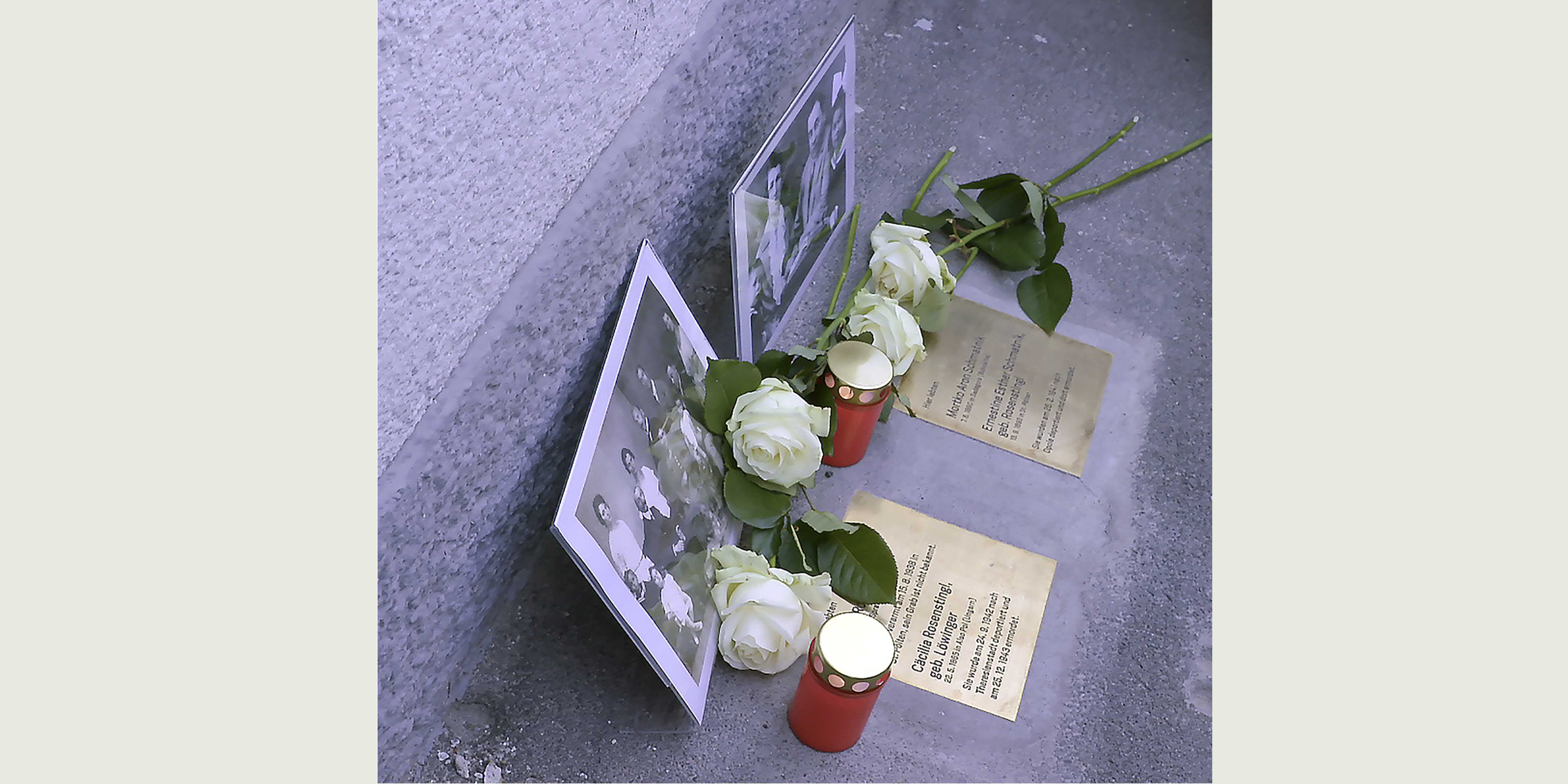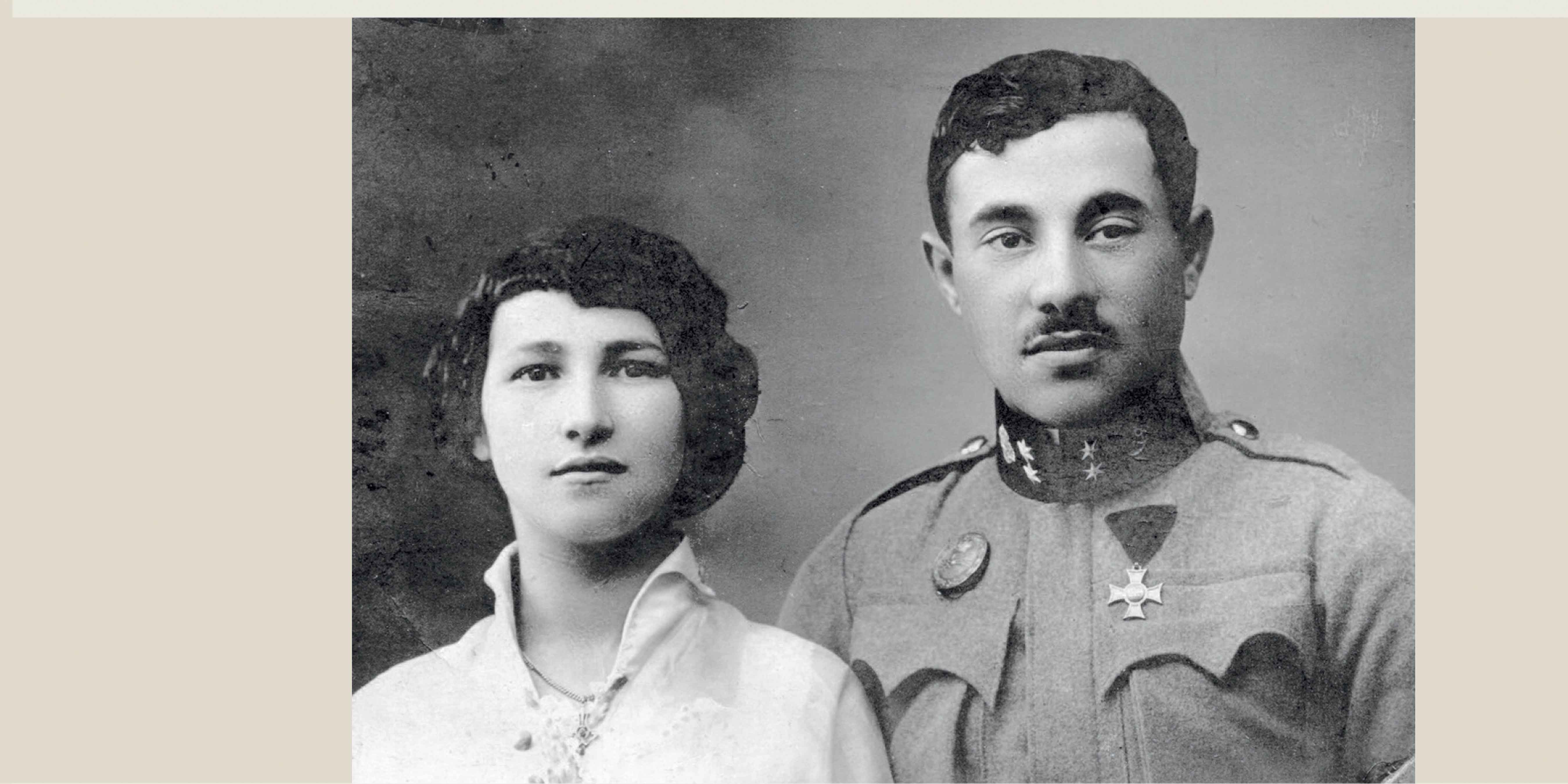
Steine der Erinnerung


Mortko Aron Schmatnik und seine Frau Ernestine Esther, geb. Rosenstingl
„Endesgefertigte bittet den bei Ihnen seit 16. XII. 38 liegenden Kaufvertrag zwischen Schmatnik – Wagner in Erledigung zu bringen, da wir ausreisen müssen und Geld für die Schiffskarten benötigen. Da die Geheime Staatspolizei uns zur Ausreise drängt und wir Gelegenheit haben bald wegzufahren, deshalb diese höfliche Bitte um Erledigung.“ (Ernestine Schmatnik an die Vermögensverkehrsstelle Wien, 15. 2. 1939)
Mortko Aron – in einigen Dokumenten auch Max Mordechai – Schmatnik, Sohn von Joel und Schlima, geb. Apfel, wurde am 7. Juni 1890 in Sadagora (Bukowina) geboren. Wann er nach St. Pölten kam, ist nicht bekannt, doch wie aus dem Foto des jungen Paares ersichtlich ist, war er als Soldat im Ersten Weltkrieg bereits mit Ernestine Esther, geboren am 13. September 1893 als Tochter des St. Pöltner Kaufmanns Moritz Rosenstingl und dessen Frau Cäcilia, geb. Löwinger, verheiratet. Ihre Kinder Elfriede und Leopold kamen 1915 und 1919 zur Welt, beide waren in der zionistischen Jugendgruppe Betar aktiv. Ab 1. Mai 1926 führte Mortko das Geschäft seines Schwiegervaters.
Aus der Tatsache, dass Mortko Schmatnik nach dem „Anschluss“ keine eigene Vermögenserklärung abgeben musste, lässt sich seine finanzielle Notlage schließen. In ihrer Erklärung vom 14. Juli 1938 gab Ernestine an, dass ihr Mann seit 1. Mai 1938 arbeitslos sei und eine Unterstützung von wöchentlich 9,90 Reichsmark beziehe. Der Sparkasse St. Pölten schuldete das Ehepaar 500 Reichsmark. Ernestine besaß zwei Bauparzellen in St. Pölten im Wert von insgesamt 5.000 Reichsmark. Der Kaufvertrag ist nicht erhalten und daher auch der Kaufpreis nicht bekannt, doch wurden am 21. August 1939 die neuen Eigentümer in das Grundbuch geschrieben. Laut Vergleichsausfertigung vom 7. Juli 1950 erhielt die Vertretung der Antragsteller 1.500 Schilling und verzichtete auf die Rückstellung der Grundstücke. Seltsamerweise ist als Antragstellerin „Ernestine Schmatnik, geb. Rosenstingl“ genannt, ihre Ermordung war also noch nicht bekannt oder wurde aus verfahrenstechnischen Gründen nicht erwähnt. Als Adresse ist Wien 9, Nußdorfer Straße 4 angegeben. Dorthin mussten Mortko und Ernestine Schmatnik am 23. März 1939 zwangsübersiedeln. Sie wurden mit einem der ersten Transporte am 26. Februar 1941 in die Kleinstadt Opole in Polen deportiert, gemeinsam mit einigen weiteren Jüdinnen und Juden aus St. Pölten. Wann das Ehepaar den unerträglichen Lebensbedingungen erlag, ist nicht bekannt. Auch Ernestines Bruder Alois, Zahnarzt in Wien, und ihre Mutter Cäcilia Rosenstingl wurden ein Opfer der Shoa. Für Cäcilia und auch für ihren Mann Moritz wird ebenfalls dieses Jahr ein Stein der Erinnerung gesetzt.
Leopold Schmatnik konnte bereits im Juni 1938 nach Palästina/Erez Israel entkommen, Elfriede folgte im November. Dort hebraisierte sie ihren Namen in Shulamit und ihr Bruder den seinen in Yehuda Shamir.
Mortko Aron Schmatnik and his wife Ernestine Esther, née Rosenstingl
“The undersigned requests that you complete the sales contract between Schmatnik and Wagner that has been with you since 16. 12. (19)38, as we must emigrate and need the money for ship tickets. As the Gestapo is urging us to emigrate and we have an opportunity to depart soon, we kindly ask you to wrap this up.” (Ernestine Schmatnik to the Vienna Property Transaction Office, 15. 2. 1939)
Mortko Aron – in some documents also called Max Mordechai – Schmatnik was born in Sadagora (Bukovina) on 7 June 1890 to Joel and Schlima, née Apfel. It is not documented when he came to St. Pölten, yet a photo of the young couple reveals that he was already married to Ernestine Esther, born on 13 September 1893 to the St. Pölten merchant Moritz Rosenstingl and his wife Cäcilia, née Löwinger, when he was a young soldier during World War I. Their children El- friede and Leopold were born in 1915 and 1919. Both were active in the Zionist youth group Betar. From 1 May 1926, Mortko took over the management of his father-in-law’s business.
The fact that Mortko Schmatnik did not have to submit his own declaration of property after the “Anschluss” indicates that he was in a financially precarious position. In her declaration dated 14 July 1938, Ernestine stated that her hus- band had been unemployed as of 1 May 1938 and received weekly benefits of 9.90 Reichsmark. The couple owed 500 Reichsmark to the Sparkasse in St. Pölten. Ernestine owned two building lots in St. Pölten worth altogether 5000 Reichsmark. The sales contract has not survived and therefore the sales price is not known, yet the new owners were registered in the cadaster on 21 August 1939. According to a settlement contract dated 7 July 1950, the representatives of the applicant received 1500 Schilling for the properties and declined their restitution. Strangely, the applicant is named as “Ernestine Schmatnik, née Rosenstingl”, meaning that her death was not yet known or was not mentioned for legal purposes. The applicant’s address was cited as Nußdorfer Straße 4 in Vienna’s ninth district.
This is where Mortko and Ernestine Schmatnik were forced to relocate on 23 March 1939. They were deported on one of the first transports to the village of Opole in Poland on 26 February 1941, along with a few other Jews from St. Pöl- ten. It is not known when the couple succumbed to the unbearable living conditions. Ernestine’s brother Alois, who was a dentist in Vienna, and her mother Cäcilia Rosenstingl also fell victim to the Shoah. A Stone of Remembrance will be placed for Cäcilia and her husband Moritz this year as well.
Leopold Schmatnik was already able to flee to Palestine/Eretz Israel in June 1938. Elfriede followed in November. There, they Hebraicized their names to Shulamit and Yehuda Shamir.